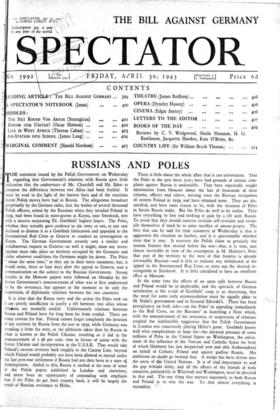RUSSIANS AND POLES
ty
THE statement issued by the Polish Government on Wednesday regarding that Government's relations with Russia gave little indication that the endeavours of Mr. Churchill and Mr. Eden to compose the differences between two Allies had been fruitful. It must be read in the light of the known facts and of the reactions recent Polish moves have had in Russia. The allegations broadcast perpetually by the German radio, that the bodies of several thousand Polish officers, seized by the Russians when they invaded Poland in 1939, had been found in mass-graves at Katyn, near Smolensk, met with a success surpassing Dr. Goebbels' highest hopes. The Poles, whether they actually gave credence to the story or not, at any rate declined to dismiss it as a Goebbels fabrication and appealed to the International Red Cross at Geneva to conduct an investigation at Katyn. The German Government astutely sent a similar and simultaneous request to Geneva—as well it might, since any inves- tigation must take place on territory occupied by the Germans and ander whatever conditions the Germans might lay down. The Poles " about the same time," as they say in their latest statement, but, it would seem, three or four days after the appeal to Geneva, sent a communication on the subject to the Russian Government. Strong articles in the Moscow papers were followed on Monday by the Soviet Government's announcement of what was at first understood to be the severance, but appears at the moment to be only the suspension, of diplomatic relations between the two countries.
It is clear that the Katyn story and the action the Poles took on it are utterly insufficient to justify a rift between two allies whose relations are normally cordial. Unfortunately relations between Russia and Poland have for long been far from cordial. There are many reasons for that. Poland cannot forget completely the invasion of her territory by Russia from the east in 1939, while Germany was invading it from the west, or the plebiscite taken then by Russia in what is known as the Polish Ukraine, resulting as it did in the announcement of a 98 per cent. vote in favour of union with the Soviet Ukraine and incorporation in the U.S.S.R. That would take Poland's eastern territory back roughly to the Curzon Line, beyond which Poland would probably not have been allowed to extend under the last post-war settlement if Russia had not then been in a state of disintegration. Added to this, Russia is nettled at the tone of some of the Polish papers published in London and elsewhere, and never loses an opportunity of contending with emphasis that if the Poles do get their country back, it will be largely the result of Russian resistance to Hide'. There is little about the whole affair that is not unfortunate. That the Poles in the past three years have had grounds of serious com- plaint against Russia is undeniable. They have repeatedly sought information from Moscow about the fate of thousands of their citizens, officers and others, missing since the Russian occupation of eastern Poland in 1939, and have obtained none. They are dis- satisfied, and have some reason to be, with the situation of Poles in Soviet Russia today. But the Poles do well to be realist. They have everything to lose and nothing to gain by a rift with Russia. To avoid that they should exercise resolute self-restraint and recon- cile themselves if need be to some sacrifice of amour-propre. The best that can be said for their statement of Wednesday is that it aggravates the situation no further, and it is questionable whether even that is true. It reasserts the Polish claim to precisely the eastern frontier that existed before the war—that, it is true, was almost inevitable in view of the assumption in M. Molotov's Note that part of the territory to the west of that frontier is already irrevocably Russian—and it fails to indicate any withdrawal of the appeal to the International Red Cross to carry out the desired in- vestigatidn at Smolensk. It is little calculated to have an emollient effect at Moscow.
At the same time the effects of an open split between Russia and Poland would be so deplorable, and the spectacle of German satisfaction at the result of Goebbels' coup is so chastening, that the need for some early accommodation must be equally plain to M. Stalin's government and to General Sikorski's. There has been precipitancy on both sides—on the Poles' in appealing immediately to the Red Cross, on the Russians' in launching a Note which, with the announcement of the severance, or suspension, of relations coupled the indefensible suggestion that the Polish Government in London was consciously playing Hitler's game. Goebbels knows well what complications to hope for—the electoral pressure of some millions of Poles in the United States on Washington, the enlist- ment of the influence of the Vatican and Catholic Spain (to both of which Germany has just despatched new and able Ambassadors) on behalf of Catholic Poland and against godless Russia.. His ambitions no doubt go beyond that. A wedge has been driven into the unity of the United Nations. It is of vital importance to seal the gap without delay, and all the efforts of the friends of both countries, particularly in Whitehall and Washington, must be directed to that end. The one thing that matters supremely to both Russia and Poland is to win the war. To that almost everything is secondary.






















